课后练习答案Unit 8 Knowledge and wisdom
Unit-8-Knowledge-and-wisdom练习答案综合教程三

Unit 8 Knowledge and WisdomKey to the ExercisesText comprehensionI. Decide which of the following best states the author's argument.CJudge, according to the text, whether the following statements are true or false. II.F (Refer to Paragraph 2. The study of the composition of atoms, or the development 1.of the atom bomb, for example, has placed in the hands of powerful lunatics the means to destroy the human race.)T (Refer to Paragraph 2. This has become more difficult than it used to be owing to 2.of required knowledge of various kinds the extent and complexity of the specialized technicians.)T (Refer to Paragraph 3. Although he had a comprehensive knowledge of history, he 3. was still partial as the chief lesson of history which he sought to inculcate was that from the year 400AD down to his own time Germany had been the most important nation and the standard-bearer of progress in the world.)F (Refer to Paragraph 4. It is true that both Mr. A and Mr. B possess some vices of 4. their respective kinds, but the fact does not prove that they are wise or unwise.) statement. extremity of the paragraph 5. The mistake lies in the 5. F (Refer to According to Russell, man cannot free himself entirely from the physical and emotional need, so one can only grow in wisdom, which itself is a matter of degree.)Answer the following questions. III.Refer to Paragraph 2. A sense of proportion could be seen as the ability to take into 1.full consideration all important factors in an issue and attach due weight to each factor. Refer to Paragraphs 1 and 2. In the first place, they are examples of the idea raised at 2. in ages age far surpasses all previous text: the very beginning of the although our knowledge, there has been no correlative increase in wisdom. The problem, according to of acquire a sense difficult the fact that it is now more to to essay, the is partly due proportion, or the ability to assign appropriate weights to various factors, thus achieving if harms bring in science are likely to about In balance. consequence, breakthroughs comprehensive everything in a and the humankind fails to see end of science consider manner.Refer to Paragraphs 1 to 4. According to Russell, the vices of the lack of wisdom are 3. obvious and palpable, ranging from disturbance to public life, most notably the upset of anbe to seems there Meanwhile, life. private in incidents unpleasant to peace, worldimbalance in the growth of knowledge and wisdom, which is very likely to make things even worse. So, wisdom is necessary for both personal and cultural developments.4. Refer to Paragraph5. According to Russell, the essence of wisdom is impartiality, or emancipation from egoistic or temporal concerns. It is naturally difficult for man to attain impartiality, as man is naturally bound up by his own physical states from his birth. As he grows up, however, his horizon widens, his concerns get beyond the limits of time and space, and his feelings become more impersonal, hence the growth of impartiality and wisdom.5. Apart from the fact that it is one of the ingredients of wisdom, impartiality is also the basis of rationality, for irrationality is normally based on partiality.IV. Explain in your own words the following sentences.1.It would be unwise to pursue a goal that is bound to fail, although it might be nobleto do so.2. I think the essence of wisdom is to get one's horizon free from the confinement oftime and space.Structural analysis of the textParagraph 2: Of these I should put first a sense of proportion: the capacity to take account of all the important factors in a problem and to attach to each its due weight. Paragraph 3: There must be, also, a certain awareness of the ends of human life. Paragraph 4: It is needed in the choice of ends to be pursued and in emancipation from personal prejudice.Paragraph 5: I think the essence of wisdom is emancipation, as far as possible, from the tyranny of the here and now.Four factors that constitute wisdom: comprehensiveness mixed with a sense of proportion; a full awareness of the goals of human life; avoidance of blindness and prejudice in private life; impartiality.Rhetorical features of the textThe capacity to take account of all the important factors in a problem and to attach to each its due weight. (Paragraph 2)This has the entirely unintended result of making the food supply inadequate and lowering the standard of life in the most populous parts of the world. (Paragraph 2) Perhaps one could stretch the comprehensiveness that constitutes wisdom to include not only intellect but also feeling. (Paragraph 3)It is not only in public ways, but in private life equally, that wisdom is needed. (Paragraph 4)Vocabulary exercisesI. Explain the underlined part in each sentence in your own words.consider (when judging a situation)/take into consideration, give proper value toeach/attach adequate importance to each2. Certainly/Very probably, brought a good and helpful effect to mankind, in reality/in actual situations3. talk (disapprovingly) about something less worthy or less important, destroy or ruin each other4. connected with/dependent on5. accordinglyII. Fill in the blank in each sentence with a word taken from the box in its appropriate form.1. pursue2. ceased3. attainable4. enmity5. populous6. surpassed7. impartial 8. appallinglyIII. Fill in the blanks with the appropriate forms of the given words.1. beneficiaries2. undesirable4. descendants 3. horizontally6. philosophical5. increasingly7. unduly8. standardizationIV. Fill in the blank(s) in each sentence with an appropriate phrasal verb or collocation taken from the text.1. required of2. sought to3. descended to4. put first5. contributed to6. engage in7. conferred8. upon9. bound up withV. Give a synonym or an antonym of the word underlined in each sentence in the sense it is used.1. Antonym: following (subsequent, succeeding)Synonym: enhance (advance)2.3. Synonym: impressive (sensational)4. Antonym: unawareness (ignorance, unconsciousness)5. Synonym: instill (indoctrinate)6. Antonym: confinement (restriction, restraint)7. Antonym: virtue8. Synonym: fairness (indifference, neutrality)VI. Explain the underlined phrasal verbs in your own words.1. contracted2. keep quiet3. investigate4. treat5. go6. lost consciousness7. tolerate8. get rid ofGrammar exercisesI. Identify the meanings of it in the following sentences.This is an emphatic it, introducing a cleft sentence.1.2. Here it is a pronoun, referring to wisdom.3. The first is an anticipatory it, serving as the formal subject. The second and third are the pronoun referring to an end.4. This is an anticipatory it, functioning as the formal subject.5. This is an emphatic it, stressing his approach towards impartiality.II. Insert it + be or there + be in the following sentences.1.there was, there was2. There are, It is, there is3. it was/would be4. It is, There will be5. It is, it is6. It is, it is7. Is there, it is, there is8. There is, It will be, it is, it is, there will be9. It is, it is10. It is, it iswherever possible. ItRewrite the following sentences, beginning with III.1. It is no good getting annoyed.2. It is illegal to drive a car without a license.3. It was far from clear where the sound was coming from.4. It is impossible to make a living from her painting.5. ?6. It was a miracle that the little girl wasn't hurt in the accident.7. ?8. It is obvious that you already know my secret.9. It will be surprising if the two countries don't reach an agreement soon.10. It is an honor that Professor Lee is attending the conference.IV. Fill in the blanks with appropriate conjunctions.1. When2. lest3. Although4. not only ... but also5. because6. Although7. While8. sinceComplete each sentence with what you think the most appropriate of the four choices V. given.B (The first time is a marginal subordinator.) 1.A 2.C3.D (unless= if ?not) 4.B 5.A 6.B 7.D 8.Make sentences of your own after the sentences given below, keeping the italicized VI.parts in your sentences.e.g. He is more like a companion than a tutor. 1.She screamed, not loudly, more in surprise than in terror.e.g. She not only took me home but also came the next day to see if I had recovered.2.Shakespeare was not only a writer but also an actor.Translation exercisesI.Translate the following sentences into Chinese.1. 我们这个时代在知识方面远远超越了以往所有时代,在智慧方面却没有相应的长进,这个说法大多数人都会同意。
Unit 8 Knowledge and Wisdom课文翻译综合教程三
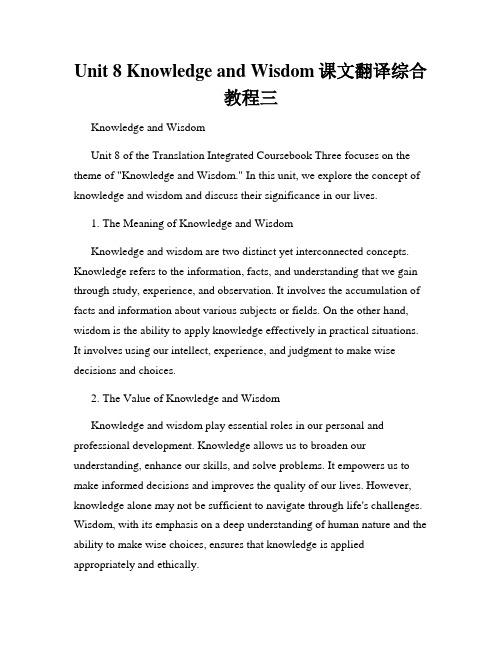
Unit 8 Knowledge and Wisdom课文翻译综合教程三Knowledge and WisdomUnit 8 of the Translation Integrated Coursebook Three focuses on the theme of "Knowledge and Wisdom." In this unit, we explore the concept of knowledge and wisdom and discuss their significance in our lives.1. The Meaning of Knowledge and WisdomKnowledge and wisdom are two distinct yet interconnected concepts. Knowledge refers to the information, facts, and understanding that we gain through study, experience, and observation. It involves the accumulation of facts and information about various subjects or fields. On the other hand, wisdom is the ability to apply knowledge effectively in practical situations. It involves using our intellect, experience, and judgment to make wise decisions and choices.2. The Value of Knowledge and WisdomKnowledge and wisdom play essential roles in our personal and professional development. Knowledge allows us to broaden our understanding, enhance our skills, and solve problems. It empowers us to make informed decisions and improves the quality of our lives. However, knowledge alone may not be sufficient to navigate through life's challenges. Wisdom, with its emphasis on a deep understanding of human nature and the ability to make wise choices, ensures that knowledge is applied appropriately and ethically.Throughout history, humans have demonstrated a relentless pursuit of knowledge and wisdom. From ancient philosophers to modern scientists, the thirst for knowledge has led to significant discoveries and breakthroughs. This pursuit involves continuous learning, questioning, and seeking new perspectives. It also necessitates critical thinking and the ability to discern accurate information from falsehoods. Wisdom, in contrast, is acquired through experience and reflection. It requires self-awareness, empathy, and an ability to recognize patterns and anticipate outcomes.4. Knowledge and Wisdom in Different FieldsKnowledge and wisdom are applicable in various disciplines and areas of life. In academia, knowledge is acquired through rigorous study and research, while wisdom is developed through critical thinking and application of knowledge. In professions such as medicine and engineering, both knowledge and wisdom are crucial for making informed decisions and solving complex problems. In personal relationships, wisdom helps us navigate emotional dynamics and make sound judgments.5. Cultivating Knowledge and WisdomCultivating knowledge and wisdom is an ongoing process that requires dedication and effort. It starts with a thirst for learning and a commitment to continuous self-improvement. Reading books, attending seminars, and engaging in intellectual discussions can expand our knowledge base. Additionally, wisdom can be developed by reflecting on past experiences, seeking guidance from mentors, and practicing empathy and self-awareness.The acquisition and application of knowledge and wisdom have transformative effects on individuals and societies. Knowledge has driven technological advancements, scientific breakthroughs, and societal progress. It has the potential to improve our standard of living, promote equality, and advance global development. Wisdom, with its emphasis on ethical decision-making, can lead to more harmonious relationships, effective leadership, and sustainable solutions to complex problems.In conclusion, knowledge and wisdom are essential for personal and societal growth. While knowledge provides us with information and understanding, wisdom allows us to apply that knowledge effectively and ethically. The pursuit of knowledge and wisdom is a lifelong endeavor that enriches our lives and contributes to the betterment of society. Let us continue striving for knowledge and cultivating wisdom in our journey towards a more enlightened and fulfilling existence.。
(完整)Unit 8 Knowledge and wisdom练习答案综合教程三
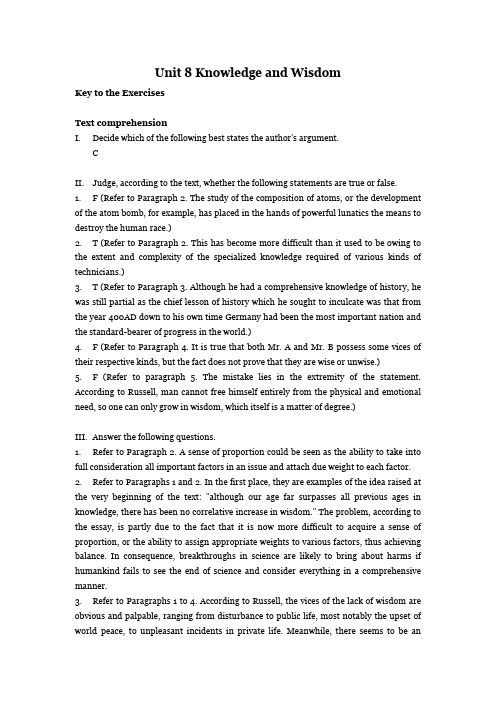
Unit 8 Knowledge and WisdomKey to the ExercisesText comprehensionI.Decide which of the following best states the author's argument.CII.Judge, according to the text, whether the following statements are true or false.1. F (Refer to Paragraph2. The study of the composition of atoms, or the development of the atom bomb, for example, has placed in the hands of powerful lunatics the means to destroy the human race.)2.T (Refer to Paragraph 2. This has become more difficult than it used to be owing to the extent and complexity of the specialized knowledge required of various kinds of technicians.)3.T (Refer to Paragraph 3. Although he had a comprehensive knowledge of history, he was still partial as the chief lesson of history which he sought to inculcate was that from the year 400AD down to his own time Germany had been the most important nation and the standard-bearer of progress in the world.)4. F (Refer to Paragraph 4. It is true that both Mr. A and Mr. B possess some vices of their respective kinds, but the fact does not prove that they are wise or unwise.)5. F (Refer to paragraph 5. The mistake lies in the extremity of the statement. According to Russell, man cannot free himself entirely from the physical and emotional need, so one can only grow in wisdom, which itself is a matter of degree.)III.Answer the following questions.1.Refer to Paragraph2. A sense of proportion could be seen as the ability to take into full consideration all important factors in an issue and attach due weight to each factor. 2. Refer to Paragraphs 1 and 2. In the first place, they are examples of the idea raised at the very beginning of the text: "although our age far surpasses all previous ages in knowledge, there has been no correlative increase in wisdom." The problem, according to the essay, is partly due to the fact that it is now more difficult to acquire a sense of proportion, or the ability to assign appropriate weights to various factors, thus achieving balance. In consequence, breakthroughs in science are likely to bring about harms if humankind fails to see the end of science and consider everything in a comprehensive manner.3. Refer to Paragraphs 1 to4. According to Russell, the vices of the lack of wisdom are obvious and palpable, ranging from disturbance to public life, most notably the upset of world peace, to unpleasant incidents in private life. Meanwhile, there seems to be animbalance in the growth of knowledge and wisdom, which is very likely to make things even worse. So, wisdom is necessary for both personal and cultural developments.4. Refer to Paragraph5. According to Russell, the essence of wisdom is impartiality, or emancipation from egoistic or temporal concerns. It is naturally difficult for man to attain impartiality, as man is naturally bound up by his own physical states from his birth. As he grows up, however, his horizon widens, his concerns get beyond the limits of time and space, and his feelings become more impersonal, hence the growth of impartiality and wisdom.5. Apart from the fact that it is one of the ingredients of wisdom, impartiality is also the basis of rationality, for irrationality is normally based on partiality.IV.Explain in your own words the following sentences.1.It would be unwise to pursue a goal that is bound to fail, although it might be noble to do so.2.I think the essence of wisdom is to get one's horizon free from the confinement of time and space.Structural analysis of the textParagraph 2: Of these I should put first a sense of proportion: the capacity to take account of all the important factors in a problem and to attach to each its due weight. Paragraph 3: There must be, also, a certain awareness of the ends of human life. Paragraph 4: It is needed in the choice of ends to be pursued and in emancipation from personal prejudice.Paragraph 5: I think the essence of wisdom is emancipation, as far as possible, from the tyranny of the here and now.Four factors that constitute wisdom: comprehensiveness mixed with a sense of proportion; a full awareness of the goals of human life; avoidance of blindness and prejudice in private life; impartiality.Rhetorical features of the textThe capacity to take account of all the important factors in a problem and to attach to each its due weight. (Paragraph 2)This has the entirely unintended result of making the food supply inadequate and lowering the standard of life in the most populous parts of the world. (Paragraph 2) Perhaps one could stretch the comprehensiveness that constitutes wisdom to include not only intellect but also feeling. (Paragraph 3)It is not only in public ways, but in private life equally, that wisdom is needed. (Paragraph 4)Vocabulary exercisesI. Explain the underlined part in each sentence in your own words.1.consider (when judging a situation)/take into consideration, give proper value to each/attach adequate importance to each2. Certainly/Very probably, brought a good and helpful effect to mankind, in reality/in actual situations3. talk (disapprovingly) about something less worthy or less important, destroy or ruin each other4. connected with/dependent on5. accordinglyII. Fill in the blank in each sentence with a word taken from the box in its appropriate form.1. pursue2. ceased3. attainable4. enmity5. populous6. surpassed7. impartial 8. appallinglyIII.Fill in the blanks with the appropriate forms of the given words.1. beneficiaries2. undesirable3. horizontally4. descendants5. increasingly6. philosophical7. unduly8. standardizationIV.Fill in the blank(s) in each sentence with an appropriate phrasal verb or collocation taken from the text.1. required of2. sought to3. descended to4. put first5. contributed to6. engage in7. conferred8. upon9. bound up withV. Give a synonym or an antonym of the word underlined in each sentence in the sense it is used.1. Antonym: following (subsequent, succeeding)2. Synonym: enhance (advance)3. Synonym: impressive (sensational)4. Antonym: unawareness (ignorance, unconsciousness)5. Synonym: instill (indoctrinate)6. Antonym: confinement (restriction, restraint)7. Antonym: virtue8. Synonym: fairness (indifference, neutrality)VI. Explain the underlined phrasal verbs in your own words.1. contracted2. keep quiet3. investigate4. treat5. go6. lost consciousness7. tolerate8. get rid ofGrammar exercisesI.Identify the meanings of it in the following sentences.1.This is an emphatic it, introducing a cleft sentence.2.Here it is a pronoun, referring to wisdom.3.The first is an anticipatory it, serving as the formal subject. The second and third are the pronoun referring to "an end."4.This is an anticipatory it, functioning as the formal subject.5.This is an emphatic it, stressing "this approach towards impartiality."II.Insert it + be or there + be in the following sentences.1.there was, there was2.There are, It is, there is3.it was/would be4.It is, There will be5.It is, it is6.It is, it is7.Is there, it is, there is8.There is, It will be, it is, it is, there will be9.It is, it is10. It is, it isIII.Rewrite the following sentences, beginning with It wherever possible.1.It is no good getting annoyed.2.It is illegal to drive a car without a license.3.It was far from clear where the sound was coming from.4.It is impossible to make a living from her painting.5.?6.It was a miracle that the little girl wasn't hurt in the accident.7.?8.It is obvious that you already know my secret.9.It will be surprising if the two countries don't reach an agreement soon.10.It is an honor that Professor Lee is attending the conference.IV.Fill in the blanks with appropriate conjunctions.1. When2. lest3. Although4. not only ... but also5. because6. Although7. While8. sinceplete each sentence with what you think the most appropriate of the four choices given.1. B (The first time is a marginal subordinator.)2. A3. C4. D (unless= if ?not)5.B6. A7. B8. DVI. Make sentences of your own after the sentences given below, keeping the italicized parts in your sentences.1. e.g. He is more like a companion than a tutor.She screamed, not loudly, more in surprise than in terror.2. e.g. She not only took me home but also came the next day to see if I had recovered.Shakespeare was not only a writer but also an actor.Translation exercisesI.Translate the following sentences into Chinese.1. 我们这个时代在知识方面远远超越了以往所有时代,在智慧方面却没有相应的长进,这个说法大多数人都会同意。
unit8 knowledge and wisdom
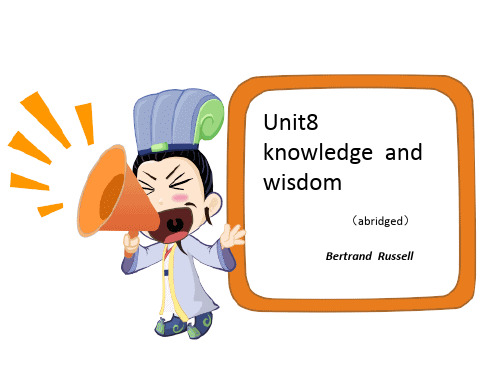
Rhetorical features of the text
Turn to page141
Can you find other examples of parallelism in the essay? Do they have anything in common?
Parallelism
You can go there on foot, by bus or by train. Studies serve for delight, for ornament, and for ability. (Francis Bacon: Of Studies) 读书足 以怡情,足以博采,足以长才。 We can gain knowledge, by reading, by reflection, by observation or by practice. 求知 门径很多,或阅读,或回忆,或观察,或实 践。
Types of Parallel Structures
Word Phrase
Clause
Sentence
She was a woman of mean understanding, little information, and uncertain temper. 她是个智力 贫乏、不学无术、喜怒无常的女人 The letter, short, cold, sharp-tongued, was unexpected. 这封简短、冷淡、挖苦的信,是出乎意外的。
To say i, riding a bicycle is similar to
drive a car. The production manager was asked to write his report quickly, accurately and in a detailed manner.
Unit 8 Knowledge and wisdom知识与智慧

Role-playing:
Scene 1 (Stage whisper: Alan Austen, as nervous as a little cat, went up certain dark and creaky stairs in the neighborhood of Pell Street, and peered about for a long time on the dim corridor before he found the name he wanted written obscurely on one of the doors…) (注意第二段中的场景布置、道具) Old Man:(表情、动作) Sit down, Mr. Austen. (语 气) I am glad to get to know you.
Role-playing:
Scene 1 (Stage whisper: Alan Austen, as nervous as a little cat, went up certain dark and creaky stairs in the neighborhood of Pell Street, and peered about for a long time on the dim corridor before he found the name he wanted written obscurely on one of the doors…) (注意第二段中的场景布置、道具) Old Man:(表情、动作) Sit down, Mr. Austen. (语 气) I am glad to get to know you.
Meditation and resourcefulness
新视野大学英语第三版第四册-Unit8-课后练习答案

Unit 8 课后练习答案Section ALanguage focusWords in use31 stalked2 expectancy3 terminate4 condolences5 chronicling6 malpractice7 retrospective 8 boycott9 incur 10 batchesWord building4Words learned New words formedbreak breakagedrain drainagebribe briberyrefine refineryconstitution constitutionalexception exceptionalinstitution institutionalorient orientalsensational sensationtutor tutorialpresident presidentialprovince provincial51 provincial2 breakage3 institutional4 bribery5 sensations6 drainage7 tutorial 8 refineries9 oriental 10 constitutional11 presidential 12 exceptionalBanked cloze61 J2 D3 H4 L5 N6 G7 A8 E9 C 10 IExpressions in use71 stay on the sidelines2 alerted... To3 turned up4 lay siege to5 followed suit6 In the face of7 put out 8 get revenge forTranslation9退学之后挣个一两百万已经成为了年轻创业者的标签,人们感到很惊讶,退学之后成为富翁的人数是如此之多,史蒂夫·乔布斯仅在里德学院上了一个学期就退学,之后成为了美国最有影响力的企业家之一;比尔·盖茨退学之后创立了自己的软件公司,并成为微软的首席执行官马克·扎克伯格从哈佛大学退学,专心致力于自己的项目,创立了脸书公司。
Unit8KnowledgeandWisdom课文翻译综合教程三
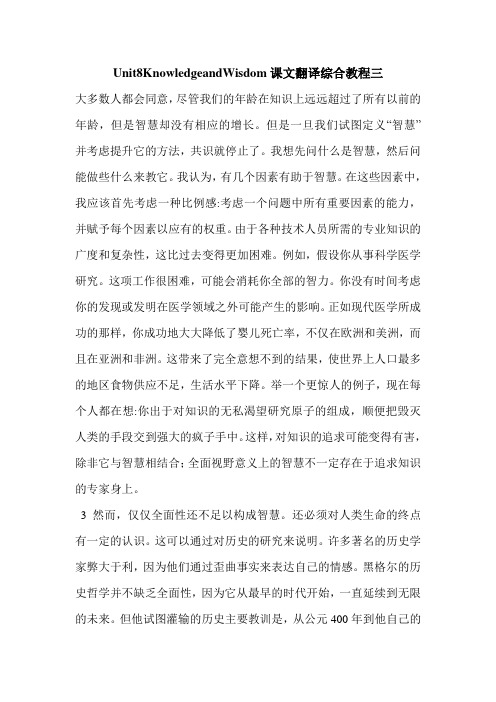
Unit8KnowledgeandWisdom课文翻译综合教程三大多数人都会同意,尽管我们的年龄在知识上远远超过了所有以前的年龄,但是智慧却没有相应的增长。
但是一旦我们试图定义“智慧”并考虑提升它的方法,共识就停止了。
我想先问什么是智慧,然后问能做些什么来教它。
我认为,有几个因素有助于智慧。
在这些因素中,我应该首先考虑一种比例感:考虑一个问题中所有重要因素的能力,并赋予每个因素以应有的权重。
由于各种技术人员所需的专业知识的广度和复杂性,这比过去变得更加困难。
例如,假设你从事科学医学研究。
这项工作很困难,可能会消耗你全部的智力。
你没有时间考虑你的发现或发明在医学领域之外可能产生的影响。
正如现代医学所成功的那样,你成功地大大降低了婴儿死亡率,不仅在欧洲和美洲,而且在亚洲和非洲。
这带来了完全意想不到的结果,使世界上人口最多的地区食物供应不足,生活水平下降。
举一个更惊人的例子,现在每个人都在想:你出于对知识的无私渴望研究原子的组成,顺便把毁灭人类的手段交到强大的疯子手中。
这样,对知识的追求可能变得有害,除非它与智慧相结合;全面视野意义上的智慧不一定存在于追求知识的专家身上。
3然而,仅仅全面性还不足以构成智慧。
还必须对人类生命的终点有一定的认识。
这可以通过对历史的研究来说明。
许多著名的历史学家弊大于利,因为他们通过歪曲事实来表达自己的情感。
黑格尔的历史哲学并不缺乏全面性,因为它从最早的时代开始,一直延续到无限的未来。
但他试图灌输的历史主要教训是,从公元400年到他自己的时代,德国一直是世界上最重要的国家和进步的旗手。
也许可以把构成9智慧的全面性扩展到不仅包括智力,还包括感觉。
发现知识渊博但感情狭隘的人绝非罕见。
这些人缺乏我所说的智慧。
不仅在公共场合,在私人生活中同样需要智慧。
在选择要追求的目标和从个人偏见中解放出来时,这是需要的。
即使是一个如果可以实现就不值得追求的目标,如果它本来就不可能实现,也可能不明智地追求。
unit8knowledgeandwisdom课文翻译综合教程三
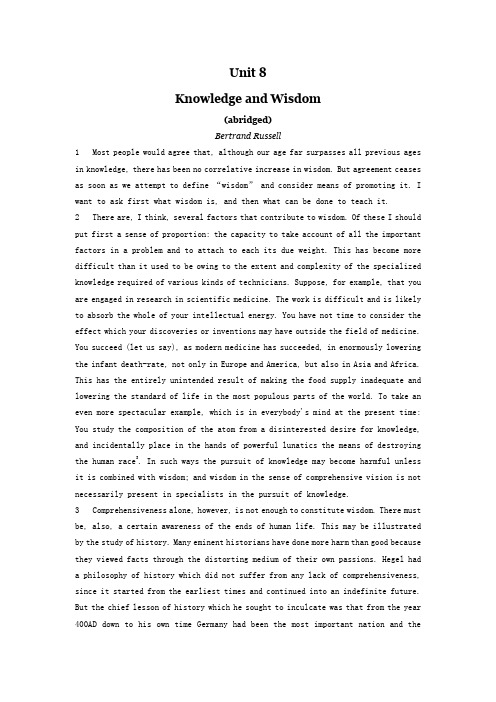
Unit 8Knowledge and Wisdom(abridged)Bertrand Russell1 Most people would agree that, although our age far surpasses all previous ages in knowledge, there has been no correlative increase in wisdom. But agreement ceases as soon as we attempt to define “wisdom” and consider means of promoting it. I want to ask first what wisdom is, and then what can be done to teach it.2 There are, I think, several factors that contribute to wisdom. Of these I should put first a sense of proportion: the capacity to take account of all the important factors in a problem and to attach to each its due weight. This has become more difficult than it used to be owing to the extent and complexity of the specialized knowledge required of various kinds of technicians. Suppose, for example, that you are engaged in research in scientific medicine. The work is difficult and is likely to absorb the whole of your intellectual energy. You have not time to consider the effect which your discoveries or inventions may have outside the field of medicine. You succeed (let us say), as modern medicine has succeeded, in enormously lowering the infant death-rate, not only in Europe and America, but also in Asia and Africa. This has the entirely unintended result of making the food supply inadequate and lowering the standard of life in the most populous parts of the world. To take an even more spectacular example, which is in everybody's mind at the present time: You study the composition of the atom from a disinterested desire for knowledge, and incidentally place in the hands of powerful lunatics the means of destroying the human race3. In such ways the pursuit of knowledge may become harmful unless it is combined with wisdom; and wisdom in the sense of comprehensive vision is not necessarily present in specialists in the pursuit of knowledge.3 Comprehensiveness alone, however, is not enough to constitute wisdom. There must be, also, a certain awareness of the ends of human life. This may be illustrated by the study of history. Many eminent historians have done more harm than good because they viewed facts through the distorting medium of their own passions. Hegel had a philosophy of history which did not suffer from any lack of comprehensiveness, since it started from the earliest times and continued into an indefinite future. But the chief lesson of history which he sought to inculcate was that from the year 400AD down to his own time Germany had been the most important nation and thestandard-bearer of progress in the world. Perhaps one could stretch the comprehensiveness that constitutes wisdom to include not only intellect but also feeling. It is by no means uncommon to find men whose knowledge is wide but whose feelings are narrow. Such men lack what I call wisdom.4 It is not only in public ways, but in private life equally, that wisdom is needed. It is needed in the choice of ends to be pursued and in emancipation from personal prejudice. Even an end which it would be noble to pursue if it were attainable may be pursued unwisely if it is inherently impossible of achievement. Many men in past ages devoted their lives to a search for the philosopher's stone and the elixir of life. No doubt, if they could have found them, they would have conferred great benefits upon mankind, but as it was their lives were wasted. To descend to less heroic matters, consider the case of two men, Mr. A and Mr. B, who hate each other and, through mutual hatred, bring each other to destruction. Suppose you go to Mr.A and say, “Why do you hate Mr. B?” He will no doubt give you an appalling list of Mr. B's vices, partly true, partly false. And now suppose you go to Mr. B. He will give you an exactly similar list of Mr. A's vices with an equal admixture of truth and falsehood. Suppose you now come back to Mr. A and say, “You will be surprised to learn that Mr.B says the same things about you as you say about him”, and you go to Mr. B and make a similar speech. The first effect, no doubt, will be to increase their mutual hatred, since each will be so horrified by the other's injustice. But perhaps, if you have sufficient patience and sufficient persuasiveness, you may succeed in convincing each that the other has only the normal share of human wickedness, and that their enmity is harmful to both. If you can do this, you will have instilled some fragments of wisdom.5 I think the essence of wisdom is emancipation, as far as possible, from the tyranny of the here and now. We cannot help the egoism of our senses. Sight and sound and touch are bound up with our own bodies and cannot be impersonal. Our emotions start similarly from ourselves. An infant feels hunger or discomfort, and is unaffected except by his own physical condition. Gradually with the years, his horizon widens, and, in proportion as his thoughts and feelings become less personal and less concerned with his own physical states, he achieves growing wisdom. This is of course a matter of degree. No one can view the world with complete impartiality; and if anyone could, he would hardly be able to remain alive. But it is possible to make a continual approach towards impartiality, on the one hand, by knowing things somewhat remote in time or space, and on the other hand, by giving to such thingstheir due weight in our feelings. It is this approach towards impartiality that constitutes growth in wisdom.论知识与智慧我们的时代在知识方面远远超过过去所有时代,在智慧方面却没有得到相应的增加,这是大多数人都会同意的看法。
- 1、下载文档前请自行甄别文档内容的完整性,平台不提供额外的编辑、内容补充、找答案等附加服务。
- 2、"仅部分预览"的文档,不可在线预览部分如存在完整性等问题,可反馈申请退款(可完整预览的文档不适用该条件!)。
- 3、如文档侵犯您的权益,请联系客服反馈,我们会尽快为您处理(人工客服工作时间:9:00-18:30)。
Unit 8 Knowledge and wisdom
Vocabulary.
1. Explain the underlined part in each sentence in your own words. (1) consider, give proper value to each; (2)certainly, brought a good and helpful effect to mankind, in reality; (3) talk about some thing less important, destroy or ruin each other; (4) connect with; (5) accordingly
2. Fill in the blank in each sentence with a word taken from the box in the proper form.
(1) pursue; (2) ceased; (3)attainable; (4)enmity;
(5)populous; (6)surpassed; (7)impartial; (8)appallingly
3. Fill in the blanks with the appropriate forms of the given words. (1)beneficiaries; (2)undesirable; (3)horizontally; (4)descendants;
(5)increasingly; (6)philosophical;(7)unduly;(8)standardization
4.Fill in the blank in each sentence with an appropriate phrasal verb or collocation taken from the text.
(1)required of; (2) sought to; (3) descended to; (4) put first;
(5)contributed to;(6)engage in;(7)conferred, upon;(8)bound up with
5. Give a synonym or an antonym of the word underlined in each sentence in the sense it is used.
(1) following(subsequent, succeeding); (2)enhance(advance);
(3)impressive (sensational); (4) unawareness(ignorance, unconsiousness) (5)instill(indoctrinate); (6)confinement(restriction, restrain)
(7)virtue; (8)fairness(indifference, neutrality)
6. Explain the underlined phrasal verbs in your own words.
(1)contracted; (2)keep quiet; (3)investigate; (4)treat;
(5)go; (6)lost consciousness;(7)tolerate; (8) get rid of
Grammar.
4.Fill in the blanks with appropriate conjunctions.
(1)When, (2)lest, (3)Although, (4)not only …but also,
(5)because, (6)Although, (7)While, (8)since
5. complete each sentence with what you think the most appropriate of the four choices given.
1~4 BACD 5~8 BABD
Translation.
(1) The result of the experiment far surpassed their expectations.
(2) We should take full account of the cost of the project and the difficulties we might encounter.
(3) The fair weather contributed to the success of the scientific expedition.
(4) Ronaldo, one of the football stars from Brazil, scored several spectacular goals in the 2002 FIFA World Cup.
(5) Many honorary degrees from different colleges and universities in America were conferred upon Robert Frost for his remarkable contributions to poetry.
(6) Patience and perseverance are required in emancipation from bad habits.
(7) They tried to instill such new ideas into students’ minds.
(8) You should demonstrate impartiality in your assessment of the employees.
Exercises for integrated skills.
2. Fill in each blank in the passage below with ONE word you think appropriate.
(1)of (2)others (3)create (4)from
(5)wisdom (6)benefit (7)without (8)All
(9)made (10)avoid (11) one (12)turn。
